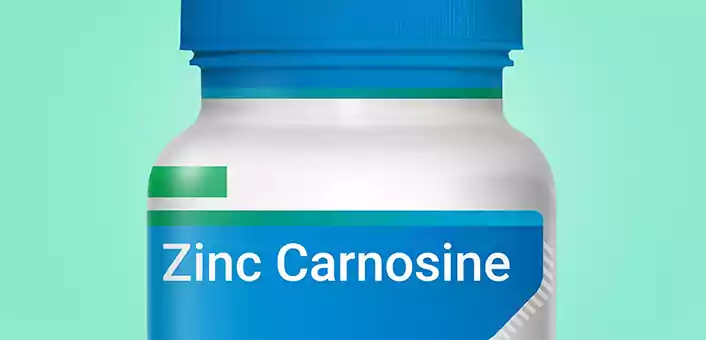
Acid Reflux
Amazing Benefits of Zinc Carnosine for GERD
Jun 10, 2017Zinc is a vital mineral that can help restore the digestive tract to optimal health. When combined with the amino acid L-carnosine, the resulting compound zinc carnosine (or zinc L-carnosine, or polaprezinc) is three times as potent as the sum of its individual components, helping heal GERD.
Zinc and Carnosine: Individual and Compound Benefits
Zinc is an immune booster and a blood sugar regulator, and it helps prevent diarrhea, supports liver health, and aids in absorption of other nutrients from food. The second-most abundant mineral in the human body, zinc is a vital cog in the biochemical machinery, participating in hundreds of crucial processes.
L-Carnosine, is an amino acid with strong antioxidant and tissue-healing properties.
Bound together in zinc carnosine, these two excellent nutrients team up to help treat gastritis, dyspepsia, and stomach ulcers. Zinc carnosine also has a restorative effect on bone loss and can prevent age-related and post-menopausal osteoporosis.
What Does Research Say about Zinc Carnosine (ZnC)?
In a clinical trial examining the effects of zinc carnosine (ZnC), researchers concluded that ZnC reduces injury to the delicate mucosal lining of the stomach and small intestines and heals the gut. Another study performed by researchers from Japan found that ZnC is capable of accelerating the healing of gastric ulcers.
In probably the most important study evaluating the role of ZnC in treating gastritis and gastric ulcers, 258 patients with confirmed gastric ulcers were tested. ZnC was pitted against cetraxate hydrochloride, a known prescription medication that helps with stomach ulcers. The results indicated that in many ways, ZnC was equal to cetraxate hydrochloride. In the long run, however, ZnC outperformed the contender.
The bacteria Helicobacter pylori have been implicated in many gut problems, including GERD. When the gut is infected with H. pylori, the immune system mounts a response by calling into action cells called PMNs and monocytes. The chemicals released by these immune cells to fight the H. pylori also cause inflammation of the delicate gastrointestinal lining, ultimately resulting in peptic ulcers. In one study, it was found that ZnC was capable of inhibiting H. pylori-mediated gastrointestinal inflammation.
The anti-ulcer and antioxidant properties of ZnC were validated in experimental findings that showed ZnC was capable of protecting the cells lining the inside of the stomach from damage typically caused by a variety of toxic substances.
Zinc Carnosine: How Does It Work for GERD?
Remember that the inside of the stomach is highly acidic. To colonize such an acidic environment and to reproduce within it, H. pylori must reduce the acidity. It does so by producing and secreting urease, which neutralizes stomach acid and produces ammonia that the bacteria can use as food. ZnC inhibits production of this enzyme urease, preventing the proliferation of the bacteria.
The healing properties of ZnC come from several unique abilities:
- It helps new mucosal cells migrate to areas of damage.
- It activates cell growth to heal stomach wounds.
- Its antioxidant properties reduce free radical-induced damage to the gastrointestinal lining.
Many studies have attested to the ability of ZnC to undo the damage done to the gut lining, as well as to correct imbalances in gut microflora caused by drugs like NSAIDs (non-steroidal anti-inflammatory drugs, or pain relievers) and PPIs (proton pump inhibitors).
Thus, ZnC is a vital supplement for people suffering from rebound hyperacidity, GERD, and complications (like ulcers) from PPI overuse.
Natural Sources
ZnC is a combination of zinc and L-carnosine that is not found in any food. It is a synthesized combination and is only available commercially as zinc carnosine. However, there are foods that are rich in zinc, and others that contain L-carnosine.
L-carnosine is present in small amounts, only in animal products like beef, chicken, and fish. Zinc can be obtained from foods like:
- Pumpkin seeds
- Dark chocolate
- Garlic
- Sesame seeds
- Watermelon seeds
- Wheat germ
- Squash seeds
- Chickpeas
Clearly, the best way to benefit from this compound is in the form of a commercially available supplement.
How Much of Zinc Carnosine?
The most common dosage, as used in all published research, is 75 mg twice daily.
Is Zinc Carnosine Safe?
While zinc carnosine, if taken at the recommended dosage, is safe and does not have any side effects, overdosing on zinc can lead to zinc toxicity and possible side effects like loss of appetite, vomiting, diarrhea, nausea, abdominal cramps, and headaches. On the other hand, L-carnosine is considered safe and no side effects have been noted even with excess intake.
Those who are pregnant, nursing, or taking any prescription medication that might interact adversely with ZnC should be careful. It is always better to take the advice of a doctor before starting any supplementation. Zinc is known to inhibit copper absorption, so increasing copper intake may be necessary when taking the ZnC supplement.
Final Verdict on Zinc Carnosine
Zinc carnosine is a unique product. Ever since its discovery in Japan, where stomach cancer was a leading cause of death, ZnC has been studied extensively for its curative and preventive effects on the mucosal lining of the stomach, as well as the small intestine.
Zinc carnosine works at the root of all diseases and chronic conditions – the gut. It fixes “leaky gut” and it heals wounds and ulcers by reducing inflammation and activating cell growth. Because of its effects on H. pylori, it can treat the problem of acid reflux at the source and reduce the risk of GERD. One big point to remember: Zinc Carnosine may confer multiple benefits to users. This is because it can help to fix a leaky gut, helping us reduce risks of autoimmune disorders like Hashimoto’s thyroiditis and rheumatoid arthritis.




